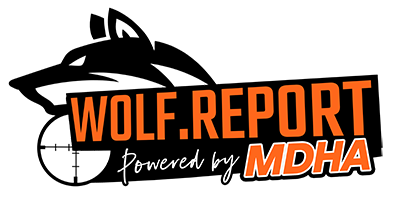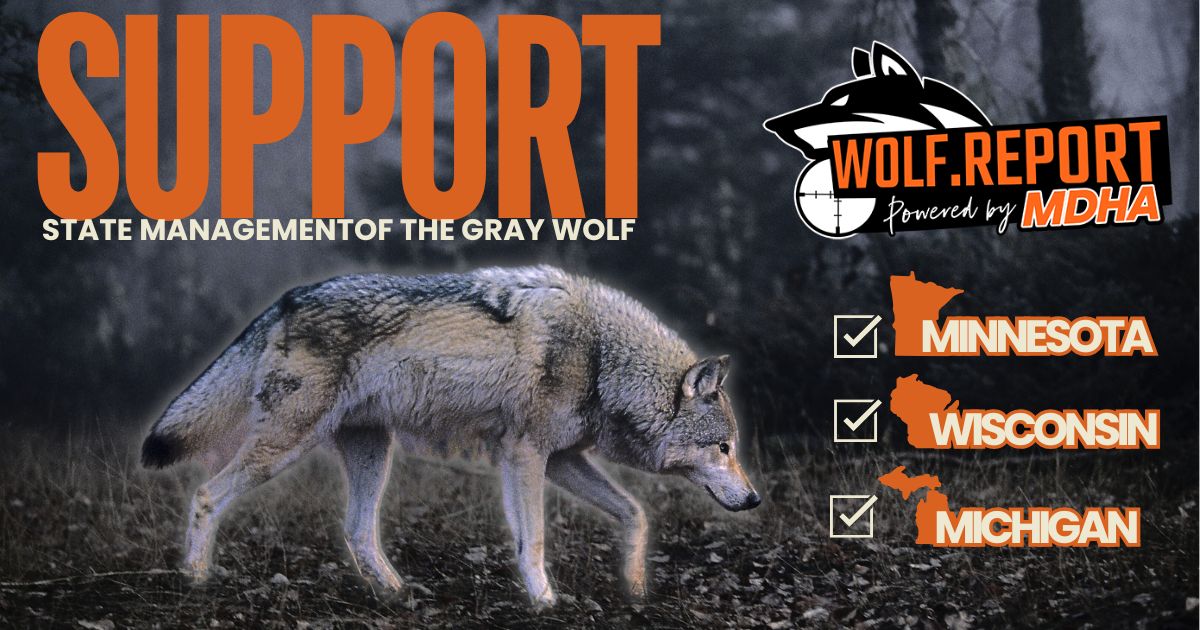

Efforts to ensure responsible wolf management are gathering steam as Wolf Report, in collaboration with the Minnesota Deer Hunters Association, amplifies its impact across Minnesota, Wisconsin, and Michigan. This growing movement underscores the pressing need for state-managed wolf control, and the momentum behind it demonstrates wide support from hunters, conservationists, and citizens alike.
Wolves are a vital part of the ecosystem, but unmanaged populations can lead to serious imbalances. Excessive wolf numbers can negatively affect deer populations, putting strain on the environment and disrupting hunting traditions that support local communities.
Currently, wolves are federally protected under the Endangered Species Act. While these protections were once necessary to prevent their extinction, wolf numbers in many areas have since recovered. States such as Minnesota, Wisconsin, and Michigan now have competent wildlife management teams ready to balance wolf populations responsibly—ensuring healthy wildlife ecosystems and preventing harmful overpopulation.
The issue is not about eliminating wolves but managing their impact. State-managed programs have the expertise and resources to implement sustainable strategies, protecting not only wolves but also deer herds, livestock, and local economies.
Recognizing the need for greater advocacy, Wolf Report expand its efforts into Wisconsin and Michigan. This is a testament to the growing urgency for state-level action and support from stakeholders in each region.
One of the most recent developments is the creation of a wolf petition supporter map Instead of being limited to a single state, this map visually showcases where citizens are actively backing responsible wolf management across all three states. From rural towns to urban centers, it’s clear that people everywhere agree on the importance of balanced wolf population control.
This data-driven approach isn’t just for show—it’s an actionable tool. The insights gathered from the petition are slated to be hand-delivered to state representatives in the upcoming year. This initiative ensures that voices from every corner of the states are heard loud and clear.
At its core, the petition is a call for responsible, state-managed wolf population control if wolves are federally delisted. This means:
This approach strikes a balance between conservation and the practical needs of rural communities, hunters, and livestock owners.
To highlight the widespread backing for state-managed wolf control, Wolf Report’s petition supporter map showcases general areas where petition signatures have been gathered. While it’s important to note that the map doesn’t reveal any personal data, it’s a powerful visual representation of statewide support.
This mapping initiative achieves several goals:
The map demonstrates that wolf management isn’t just a small, concentrated interest—it’s a cause championed by a diverse cross-section of people. From northern forests to southern cities, support crosses geographic and demographic boundaries.
State representatives often rely on hard data to justify legislative proposals. The supporter map provides exactly that, offering undeniable proof that their constituents want action.
Seeing widespread support empowers individuals to share the petition with friends, family, and neighbors. It fosters a sense of unity among hunters, wildlife enthusiasts, and citizens who care about balanced ecosystems.
If you’re a hunter, this petition directly ties to your passion and the future of wildlife management in the region. Here’s why you should lend your support:
Overpopulated wolf packs can significantly reduce deer numbers, threatening hunting prospects in terms of both quality and quantity.
Responsible wolf management doesn’t mean eradicating wolves—it means ensuring a stable and healthy population for generations to come.
For rural communities that rely on hunting for sustenance and livelihood, controlling wolf numbers is vital. It also reduces the risk of wolves preying on livestock.
Allowing unregulated wolf populations to grow unchecked can disrupt local hunting practices, making it harder to pass this tradition on to future generations.
By signing the petition, hunters have the opportunity to shape policies that benefit not just them personally, but entire ecosystems and communities.
The next steps in this movement are clear and impactful:
Wolf Report and its collaborators will hand-deliver the compiled petition data to policymakers, advocating for legislative changes that enable responsible state wolf management.
The campaign relies on supporters like you to spread the word. Every conversation, social media share, and signature adds weight to the cause.
Once the federal government removes the wolf’s protected status, states will immediately gain the authority to implement their own management plans. By advocating proactively, states can hit the ground running when the time comes.
If you haven’t signed the petition yet, now is your chance to make a difference. Every signature strengthens the case for state-managed wolf control. Visit the petition link today to sign and share it within your networks. Remember, this movement grows through word of mouth—so forward the link, post about it on social media, or discuss it with friends and fellow hunters.
Together, we can ensure that wolves, deer, and local communities coexist in a balanced way.
The momentum behind the wolf management petition is undeniable. With help from organizations like Wolf Report, MDHA and the tireless support of committed individuals, this movement is taking shape across Minnesota, Wisconsin, and Michigan.
Sign the petition. Share it broadly. Join a growing community of people dedicated to protecting natural ecosystems while respecting the needs of hunters and rural communities.
Your voice matters—use it to make a lasting impact.
